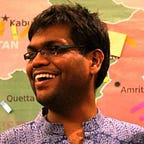The Pakistani laureate
(This piece was first published in Business Standard.)
When diplomats in India and Pakistan have made it their priority to shame each other on the international stage, the work of making peace is left to the people of both countries. What they seek is not political office but an opportunity to end decades of hostility. The proxy war might be profitable for the global military industrial complex but it has had debilitating consequences for individuals sharing cultural affinities that borders cannot erase.
As the ones holding the reins tighten their grip, others rise up to resist. Artists have always found ways to collaborate even though the visa regime conspires to eliminate contact between Indians and Pakistanis. Not only are they enabled by social media but many of them have opportunities to meet in a third country away from the cartographic anxieties of nation states threatened by cultural exchange.
The latest Indo-Pak venture that celebrates this desire to overcome barriers is a documentary titled Salam: The First ****** Nobel Laureate, which is now available on Netflix. It is directed by Anand Kamalakar who was born and raised in India but lives in New York, and produced by Omar Vandal and Zakir Thaver who grew up in Pakistan and moved to the United States of America for their higher education. This film pays tribute to a Pakistani scientist named Abdus Salam (1926–1996) who was awarded the Nobel Prize for Physics in 1979.
Such an honour is rare, and he was acutely aware of this as a Muslim man from a so-called Third World country working in a predominantly white and Eurocentric universe that looked in a patronizing manner at people like himself. Unfortunately, Pakistan did not care as much about his commitment to his faith. Under the dictatorship of General Zia-ul-Haq, it became an Islamic Republic which persecuted the Ahmadiyya community that Salam was part of. Ahmadis were forbidden from calling themselves Muslims because they did not consider Muhammad as the last prophet.
The genocide of Ahmadis in Pakistan has come up for discussion in global human rights forums but the volume of reporting has remained abysmally low. This film will hopefully change that. The fact that Salam had helped set up Pakistan’s nuclear programme did not earn him any brownie points with the religious extremists, and he felt compelled to live in Europe where he could pursue his life’s calling unafraid of being killed for calling himself a Muslim.
He enjoyed tremendous professional success but was heartbroken by the fact that he had to leave his country. It was a wound that festered in his heart until the very end. Though he could not reside in Pakistan, he wanted to be buried there after his death. This wish was fulfilled. Unfortunately, those who carried hate in their hearts would not let him rest in peace even after he died. Salam was the world’s first Muslim Nobel laureate but the word ‘Muslim’ was defaced from his gravestone. That is why the title of the film replaces the word ‘Muslim’ with ******.
Salam wanted to stay connected to his roots, and to give back. He dedicated much of his time, expertise and resources towards establishing the International Centre for Theoretical Physics in Trieste, where young scientists from Pakistan and elsewhere in the Global South could pursue their research interests in a supportive environment and engage in dialogue with peers from all over the world. After stepping down as an advisor to the Government of Pakistan, he became a strong advocate for nuclear disarmament. He also visited India. Amidst the rich archival material used in this film is a video clip featuring Salam wherein he is asked to give a message to politicians. “First of all, they should get rid of nuclear weapons,” he says.
Whether India and Pakistan are willing to listen is anyone’s guess, especially when the leadership on both sides is not only uninspiring and jingoistic but caught up in meaningless gestures of one-upmanship that do not benefit their citizens in the least. Salam was born in pre-partition India. He knew of a time when the two countries did not exist as separate entities carved out of bloodshed and barbed wire. While the film does not explore his thoughts on the Partition of 1947, Salam did witness that horrific chapter of history which was drenched in communal discord.
Decades after the violence that broke out under the watch of the British, India and Pakistan are still locked into a conflict that is influenced by religious extremists. The value placed on scientific temper and critical enquiry is on the decline. It is in this context that Salam is an extremely relevant film. It encourages viewers to question state-sanctioned narratives and sectarian violence but also refrain from whitewashing Salam into a hero without any flaws. Watch the film to learn more.
